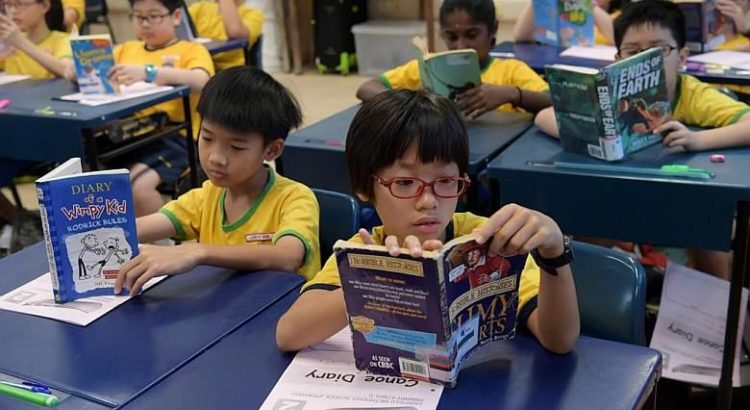Singapur/Enero de 2018/Fuente: Straitstime
Resumen:
Los alumnos de la escuela primaria 4 en Singapur han quedado segundos en una prueba internacional que midió qué tan bien pueden leer, de 58 territorios.
Los resultados del estudio Progress in International Reading Literacy, que se publicó el mes pasado, también descubrieron que los alumnos superaron a sus compañeros en otros países en lectura y navegación de texto en línea.
Los alumnos de Singapur llegaron a la cima, superando otros 13 territorios, como los Estados Unidos, en la tarea en línea, lo que les obligó a responder preguntas relacionadas con la información en la Web.
Primary 4 pupils in Singapore have emerged second in an international testthat measured how well they can read, out of 58 territories.
The results of the Progress in International Reading Literacy Study, which was released last month, also found that pupils here outperformed their peers in other countries in reading and navigating online text.
Singapore pupils came up tops – surpassing 13 other territories such as the United States – in the online task, which required them to answer questions related to information on the Web.
This is the first time that the study – which has been administered every five years since 2001 – has included a component to assess how pupils understand online information, to capture the changing nature of how young people gather and process information in a digital age.
About 6,500 pupils from all 177 primary schools here took part in the test in 2016. More than 319,000 pupils worldwide took part.
Russia was top out of 58 education systems in this round, while Hong Kong was third, Ireland fourth and Finland fifth.
The test, sponsored by the International Association for the Evaluation of Educational Achievement, evaluated pupils’ reading and comprehension skills, such as retrieving and connecting pieces of information, and making inferences from text.
Pupils were given two reading passages – narrative fiction as well as information-based texts such as news articles – and had to answer multiple-choice and written-response questions.
More than a quarter – or 29 per cent – of Singapore pupils achieved the “advanced” benchmark – the highest level of attainment in the 2016 study, similar to 2011’s results. The international proportion of such pupils was only 10 per cent.
The results mean that the pupils did well in higher-order skills such as interpreting and evaluating information.
The Ministry of Education (MOE) attributed Singapore’s improvement in literacy performance to changes in the way the English language has been taught in schools in the past decade.

These include the introduction of the Strategies for English Language Learning and Reading (Stellar) in primary schools.
Under the Stellar programme, grammar and vocabulary are taught through children’s stories and text, instead of textbooks and worksheets.
Mr Sng Chern Wei, MOE’s deputy director-general of education (curriculum), said: «We are heartened that the curricular strategies – such as Stellar – which are engaging and factor in our local diverse context, have shown success.
«Our students have displayed stronger literacy as well as communication and higher-order reading skills, which will ensure they are confident and well positioned to navigate today’s ever-changing society.»
Weaker pupils showed a marked improvement as well. Only 3 per cent of pupils here performed below the “low” benchmark in reading in 2016, compared with 14 per cent across all participating education systems.
In 2011, Singapore’s proportion of such pupils was also 3 per cent, but the figure was 10 per cent in 2001.
Ms Sofia Gita Parkash, head of the English language department at Fairfield Methodist Primary School, said that Singapore has a high standard of English language, and students benefit from a strong national curriculum.
She said her school is constantly thinking of ways to imbue pupils with a love for reading, especially among those who may not have been exposed to the English language at home, as well as improving their comprehension and speaking skills.
In its daily Buddy Reading Programme, upper primary pupils pair up with Primary 1 pupils who are weaker in the language, to listen to them read storybooks, help them along the way and explain the meaning of certain words if necessary.
The school has also started to train selected pupils to be reporters and ambassadors for their school, with the aim of getting them to use communication skills in authentic settings.
This means hosting school visitors and leading them on tours of the school compound, learning to use a software to put together news video clips, and writing for a school publication.
About 120 pupils are currently part of this programme, which started three to four years ago.
Ms Parkash said that communication skills are important when it comes to the English language. «We’re not just concerned about the conventions of grammar. We want pupils to learn how to greet people, how to code switch, how to react to different situations, cultures and contexts.»
The Progress in International Reading Literacy Study also found that parents play an important role in their children’s reading literacy.
Children whose parents engaged them frequently in activities such as reading or talking when they were younger, or sang to them, did better than their peers who did not get the same level of exposure, even if they came from similar home backgrounds.
Primary 6 pupil Nathaniel Tang said that his father, a 44-year-old manager in a telecommunications company, read picture books to him every day when he was younger.
«Now it’s become a habit. Whenever I have free time, I will read,» said the 11-year-old, who likes reading novels, National Geographic and military magazines.
Similarly, Ms Kam Sook Wei has exposed her Primary 2 daughter and Kindergarten 2 son to a daily routine of reading from as young as four months old.
“I read to them every night, whether or not they were listening. At that time (four months), it was more about voice recognition,” said the 35-year-old who runs her own business.
“In the car, I also play audio books, turn on the BBC, and we have books in the car for them to read.”
But beyond doing well in comprehension and language tests, more can be done to encourage children to be spontaneous in situations, said Ms Kam.
“I find that our children don’t do very well in answering off-the-cuff questions,» she said.
Fuente: http://www.straitstimes.com/singapore/education/primary-school-pupils-in-singapore-take-second-place-in-global-benchmarking








 Users Today : 44
Users Today : 44 Total Users : 35403237
Total Users : 35403237 Views Today : 63
Views Today : 63 Total views : 3332502
Total views : 3332502